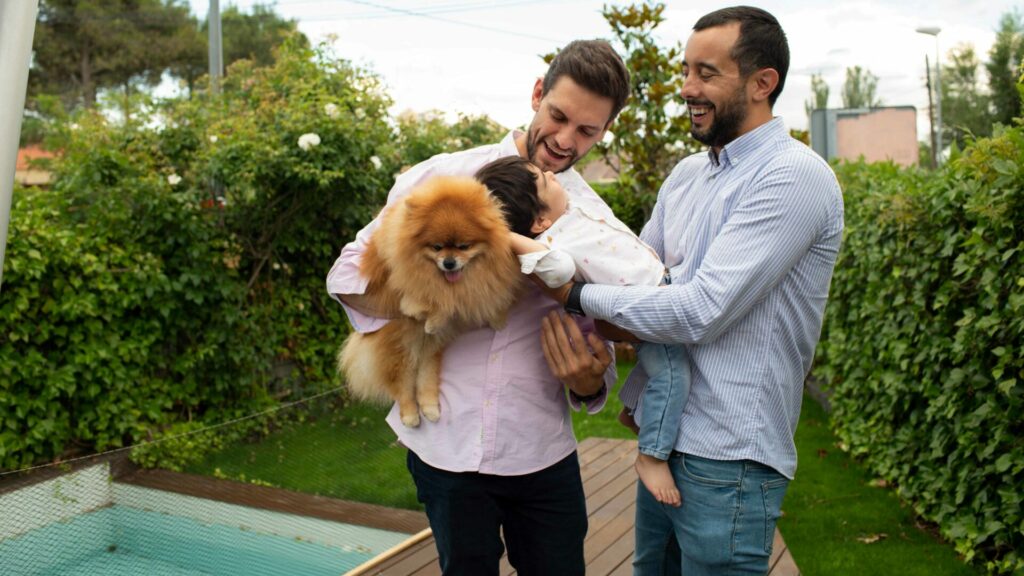
The Trade Desk’s Nacho Igual talks to myGwork’s Pepi Sappal about how he navigated his career success alongside his challenging journey to parenthood.
Nacho’s life took an unexpected yet joyous turn when he received a life-altering call from Spain’s National Adoption Centre. After a tedious eight-year wait, he and his partner were finally next in line for the adoption selection process.
Spain’s arduous adoption process involves meticulous scrutiny and a considerably long waiting period, shared Nacho. “But we felt very supported throughout this by the National Adoption Centre. Thanks to Spain’s progressive policies, all parents are evaluated equally.”
Adoption waiting lists can close for up to four years or more in Spain. Nacho and his partner got on the list thanks to a timely prompt from a good friend just a week before it closed. “Once on the list, there’s at least an eight-year waiting list to get assessed, verified and granted a ‘carta de idoneidad’, which is an official requirement to be an adoptive parent in Spain,” explained Nacho. “Even then, there’s no guarantee you will get a child through adoption. It’s a long and tough process, as very few babies are put up for adoption thanks to Spain’s excellent social care.”
“When we finally got the news that our baby was ready for us, my colleagues rallied around me to celebrate the news of my son’s arrival.”
After nearly a decade of waiting, it was another 10 months before their baby came home with them. Nacho praised the professionalism and meticulous interviews in the selection process carried out by Spain’s adoption agency. The supportive treatment was also mirrored by his employer, The Trade Desk. Nacho’s managers accommodated his requests for time off for the interviews and assessments required by the adoption process.
Nacho soon discovered that The Trade Desk’s caring culture extended beyond the adoption process. “When we finally got the news that our baby was ready for us, my colleagues rallied around me to celebrate the news of my son’s arrival.”

Having an employer that is compassionate and flexible is hugely important to Nacho. “Shortly after I returned to work in April 2023, I was promoted to Lead Director, Business Development, which involves additional responsibilities to bring in new business, on top of supporting existing clients and improving marketing KPIs. The company also continues to offer flexible work arrangements, which I deeply value.”
Parenthood, however, comes with many challenges in Spain, particularly for LGBTQ+ couples. “Options for gay male couples in Spain are limited to adoption and fostering, as there is a ban on surrogacy,” explained Nacho. Fostering is an avenue that Nacho and his partner may explore later on, should they decide to extend their family.
“As a teen, my biggest fear was that I would have to remain closeted and enter a traditional marriage with a woman and not be able to live authentically”
Nacho’s story offers great hope to others in the LGBTQ+ community seeking to become adoptive parents. However, he emphasised the importance of early applications to avoid missing out. His experience of fatherhood has been intense, marked by “profound feelings of love and protection.”
Reflecting back on his life, Nacho never imagined that he would be able to live the authentic life he does now. As a child born in Valencia in the 1980s, he grappled with the fear of living a closeted life: “I knew I felt different and was attracted to boys from the age of 12, and I worried that my friends and family would discover I was gay. As a teen, my biggest fear was that I would have to remain closeted and enter a traditional marriage with a woman and not be able to live authentically. Coming to terms with my identity was really frustrating as a young person.”
“I was grateful to my parents for embracing my identity without any awkwardness”
He was terrified to come out to his friends, but when he did, his worst fears disappeared. Nacho came out to his friends and family in his early 20s while at university. Once he fully assumed his LGBTQ+ identity and came out, he also began inviting his dates and partners to his family reunions just as his siblings did. “I was grateful to my parents for embracing my identity without any awkwardness. In fact, I never had to sit them down and talk to them about me being ‘gay,’ as they already seemed to know, so it was a really smooth transition,” shared Nacho.
It was after Nacho moved to Madrid for work in 2006 that he met his current partner, who he married in 2013: “We had an extravagant big Spanish wedding in Madrid, inviting over 200 friends and family.”
Nacho’s journey as an openly gay man unfolded against a backdrop of societal transformation in Spain. The country’s commitment to equality is evident in its ground-breaking legislation that supports the rights of LGBTQ+ individuals. In 2005, Spain proudly became the third European country to legalise marriage equality, and the second to permit adoption by same-sex couples.
“I didn’t feel the need to hide my identity anymore”
Nacho believes that the timing worked in his favour as attitudes towards the LGBTQ+ community were changing for the better: “It was becoming more normalised and accepted to be gay, with more spaces to go out and hang out with other LGBTQ+ people, so I didn’t feel the need to hide my identity anymore.”

Non-traditional families are quickly becoming the norm in Spain, especially in the bigger cities, added Nacho: “While not all cities and towns are as advanced as Madrid, Valencia or Barcelona, my experience of being LGBTQ+ has been a very positive one, where I feel that I have the same rights as heterosexual people in Spain.”
Of course, he acknowledges that older LGBTQ+ people did not have it as easy as his generation, especially under Franco’s dictatorship back in the seventies when LGTBQ+ people faced harsh persecution.
“After my mother passed away a few years ago, my father confided in me that he was confused about his identity”
Progressive attitudes in Spain have enabled Nacho to come out and stay out. His father has also recently come out as gay thanks to the country’s progressive changes: “After my mother passed away a few years ago, my father confided in me that he was confused about his identity. Although he had a very happy marriage, and loved my mother very deeply, he shared that he suspected he might be bisexual or gay. My advice to him was to take some time out to explore his identity.”
Thanks to Nacho’s advice, his father has once again found true love and happiness – this time with a man: “They now live together with their dogs and are very happy. My father says he is indebted to me as he believes he would not have found happiness again had I not given him my blessing to explore his identity. But for me, it was just my way of paying him back for the unconditional love and support that he and my mother had always shown me.”
Nacho is grateful to live in a time, and a city, that embraces LGBTQ+ and non-traditional families. However, he calls for continued advocacy for LGBTQ+ rights, stressing the need to remain vigilant, even in regions where these rights are firmly established.
“We still need to carry on fighting for our rights because, as history shows, things can change very quickly. We must not lower our guard. Those that have a voice must continue to be vocal for those in other parts of the country and world where equal rights for the LGBTQ+ community have yet to be established,” concluded Nacho.
The Trade Desk is a proud partner of myGwork, the LGBTQ+ business community.
